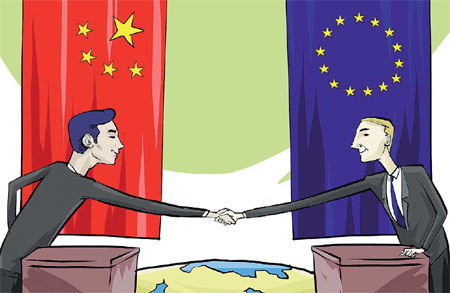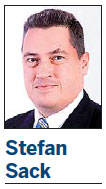Common interests exceed differences
Updated: 2014-10-24 07:32
By Stefan Sack(China Daily Europe)
|
|||||||||||


Participants at Hamburg Summit from China and the EU felt comfortable enough to tell a few home truths
China and Europe have much to gain in working together. This was the joint message delivered by the European and Chinese delegations at the recent Hamburg Summit. It was a special pleasure for me to attend the summit because Hamburg is my hometown, and my current home is Shanghai, one of Hamburg's partner cities.
As the world changes ever more rapidly, having reliable and growing relationships is not only a plus for economic development but also helps maintain peace in the world. Political leaders such as China's Premier Li Keqiang, EU Commissioner for Trade Karel de Gucht, Luxembourg's Prime Minister Xavier Bettel and Germany's Foreign Minister Frank-Walter Steinmeier showed their commitment to develop these relationships and economic ties even further with their presence at the summit and their speeches there.
During Li's visit to Berlin, European industry in turn showed its commitment to these relationships through signing or reconfirming many contracts in industries such as automotive and aviation.
However, there is still room for improvement and, as the saying goes, better is the enemy of "good enough". Half of the participating European companies in this year's edition of the European Chamber's Business Confidence Survey said the "golden age for multinational companies in China is over". On the one hand this finding exemplifies the trend that we are moving toward normality, i.e., more moderate expectations for China's economic growth. On the other hand, it shows that there are still a number of topics that urgently need to be addressed.
During the Third Plenum last November, the Central Committee of the Communist Party of China agreed on a far-reaching reform agenda. This widely applauded agenda, aptly referred to as the Decision, lists many of the items that both European industry and the European Chamber have long sought.
The focus on the market, to let it "play the decisive role in allocating resources" and "let the government play its functions better", as stated in the Decision, is exactly what is needed. The new market model needs to be implemented quickly, and these reforms will lead to more sustainable and fairer development of companies, foreign and local, that are active in China.
Other topics such as financial reform (including but not limited to the liberalization of interest rates in order to get overcapacities in many industries under control) and reform of state-owned enterprises are other important pillars to achieve this goal, to be market-driven.
The China Pilot (Shanghai) Free Trade Zone is another good example of China's reforms. European companies strongly applauded the opening of this laboratory for reforms that was initiated by Li and opened a little more than a year ago.
A number of reforms have been started in the zone, and we can see positive developments in the administrative and customs areas in particular. However, what Europeans and other foreign investors still expect is a clear commitment to further market opening. The adoption of the negative list replacing the foreign direct investment catalogue is a paradigm shift, and is a first important step in opening the market. Now it is time to remove the restrictions and let foreign investors better participate and contribute to the development of a new silver age, one of moderate but sustainable growth for the benefit of China and its people.
Market-driven economies have shown a lot of ingenuity in getting problems solved through market forces that drive innovation and technological progress. Protected companies normally will be unable to achieve the same level of competitiveness, so they will deliver less value for a country's population. European companies are ready and open to contribute to solving the challenges China faces with environmental protection, to cite but one example. This was clearly articulated in a panel discussion on urbanization in China at the Hamburg Summit, but this also requires a more open approach that is free from restrictive rules on investment.
One item on the agenda of the Fourth Plenum, held over the past few days, was the rule of law. This is another area where quick wins can be made and low-hanging fruit can be harvested. The determination of China's new leadership in making clear that "no organization or individual has the privilege of overstepping the constitution and laws" has been proven in several cases over the past year. This is particularly the case in the anti-corruption campaign as well as in the recent application of anti-monopoly law.
This is generally welcomed, as a level playing field requires predictable and transparently applied laws that have been formed in public consultation and that help to create accountability and compliance if enforced uniformly.
In Europe, the Roman goddess of justice is shown as a blindfolded figure wielding sword and scales. She has to be both powerful, hence the sword, and impartial, thus the blindfold. However, according to a recent survey, European and US companies believe that in the administration of justice in China there is a tendency to partiality. There have also been reports of due process not being adhered to.
The current lack of activity in the anti-monopoly law cases is a good opportunity not only to have a closer look at the way the different bodies (National Development and Reform Commission, the State Administration for Industry and Commerce and the Ministry of Commerce) work but also to further clarify the rules.
Where there is change there is always friction, and friction creates noise. A subsequent recalibration of the machine is the solution. For example, last year's trade tensions between the EU and China were turned into a model that can be used to further deal with disagreements in a more cooperative way. Less than 18 months ago the tensions arising from differences regarding the trade in photovoltaic products led first to retaliation by China with wine, before the matter was settled through dialogue. Settled does not mean that parties give up positions they regarded as rightful; it means that understanding is enhanced and a common set of rules is followed and agreed on. Predictability and transparency is needed to create a climate conducive to investment and prosperity.
This is very much in line with what the newly established Chinese-German Chamber of Commerce is asking for. In dialogue between Chinese and German authorities, mutual understanding is created, and problems such as visa restrictions for business travelers are being jointly addressed. Steinmeier said in his luncheon speech in Hamburg that he had agreed with his Chinese colleague Wang Yi to open more offices in China to take visa applications. This is another way of helping businesses and indeed the public at large.
Friends need to be frank with one another, so it was also possible and necessary to exchange controversial views at the summit. While European companies are demanding to be treated as equals in government procurement and expect China to open up its government procurement market by entering into international agreements, Chinese companies want to better understand the rules and regulations of European labor law and other regulations differing from China's own. Both topics were addressed. Even if problems in these areas cannot be solved immediately, putting them on the agenda means steps are ready to be taken for mutual growth.
In his summit speech Karel de Gucht quoted the European politician Jean Monnet, who talked about European unification, though his statement can also be applied to the Sino-European relationship: "Make men work together. Show them that beyond their differences and geographical boundaries there lies a common interest."
The author is CEO of Comau China and vice-president of the European Union Chamber of Commmerce in China. The views do not necessarily reflect those of China Daily.
(China Daily European Weekly 10/24/2014 page12)
Today's Top News
Highlights of Shenzhen Int’l Photography Week
Palace Museum needs to design landmark souvenirs
In Guangdong, 42 hours of fear
Ambassador urges young people to build up ties
Capital outflow fears unfounded
New proposals for care of the elderly
European Council appoints new commission team
Financing of projects focal point for APEC
Hot Topics
Lunar probe , China growth forecasts, Emission rules get tougher, China seen through 'colored lens', International board,
Editor's Picks

|

|

|

|

|

|





